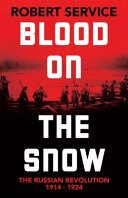

Most ebook files are in PDF format, so you can easily read them using various software such as Foxit Reader or directly on the Google Chrome browser.
Some ebook files are released by publishers in other formats such as .awz, .mobi, .epub, .fb2, etc. You may need to install specific software to read these formats on mobile/PC, such as Calibre.
Please read the tutorial at this link: https://ebookbell.com/faq
We offer FREE conversion to the popular formats you request; however, this may take some time. Therefore, right after payment, please email us, and we will try to provide the service as quickly as possible.
For some exceptional file formats or broken links (if any), please refrain from opening any disputes. Instead, email us first, and we will try to assist within a maximum of 6 hours.
EbookBell Team

4.3
58 reviewsIn Blood on the Snow, Robert Service returns to the subject that has formed the backbone of his long and distinguished career: the Russian Revolution.
For Service, the great unanswered question is how to reconcile the two vital narratives that underpin the extraordinary but troubled events of 1917. One puts the blame squarely on Tsar Nicholas II and on Alexander Kerensky’s provisional government that deposed him. The other is the view from the bottom, that of the workers and peasants who wanted democratic socialism, not the Bolshevik dictatorship imposed by Vladimir Ilyich Lenin and his successors.
Service's vivid and revisionist account spans the period from the outbreak of the First World War to Lenin’s death in 1924. In it, he reveals that key seeds of the revolution were sown by the Tsar's decision to join the war against Germany in 1914. He shows with brutal clarity how those events played out, eventually leading to the establishment of the totalitarian Soviet regime, which would endure for the next seven decades.
Nicholas II, Kerensky and Lenin are to the fore, but Service enriches his narrative by drawing on little-known diaries of those such as the Vologda peasant Alexander Zamaraev, the NCO Alexei Shtukaturov and the Moscow accounts clerk Nikita Okunev. Through the testimony of these ‘ordinary’ people, Service traces the tortuous path that Russia took through war, revolution and civil war.